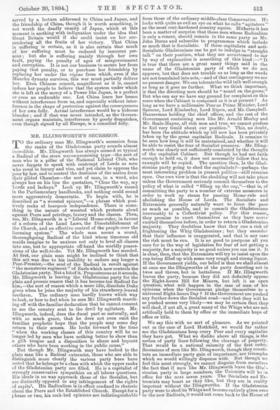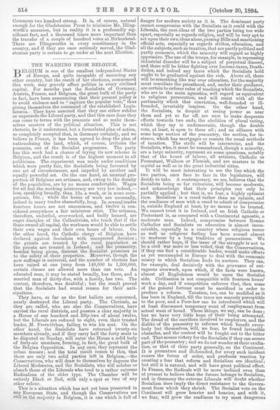MR. ILLINGWORTII'S SECESSION.
TO the ordinary man Mr. Illingworth's secession from the ranks of the Gladstonian party sounds almost incredible. Mr. Illingworth has always seemed so typical a Radical of the stern uncompromising type—the sort of man who is a pillar of the National Liberal Club, who never forgets to speak with contempt of Lords as men who revel in luxury and vice, and yet claim to oppress the poor by law, and to control the destinies of the nation from their gilded Chamber—the sort of man, in a word, who always has on his lips the quotation, "Clear the way, my Lords and lackeys." Look up Mr. Illingworth's record in the Parliamentary handbooks, and nothing could sound more aggressively democratic. To begin with, he is described as "a worsted spinner,"—a phrase which posi- tively reeks of bourgeois independence. There is some- thing in the nature of worsted which protests aloud against Peers and privilege, luxury and the classes. Then, too, Mr. Illingworth is a "Liberal Home-ruler, in favour of a reform of the Land Laws, the Disestablishment of the Church, and an effective control of the people over the licensing system." The whole man seems a sound, thoroughgoing Radical of the kind whom timorous old maids imagine to be anxious not only to level all classes into one, but to appropriate off-hand the worldly posses- sions of the well-to-do. Yet Mr. Illingworth has seceded. At first, our plain man might be inclined to think that this act was due to his inability to endure any longer a Peer-Premier,—the soul of the Radical in revolt against "the monstrous regiment" of Earls which now controls the Gladstonian party. Not a bit of it. Preposterous as it sounds, Mr. Illingworth is leaving the Gladstonian party for the plain and prosaic reason that it has become too Radical for him,----the sort of reason which a mere idle, dissolute Duke gives when he joins the majority of his strawberry-leaved brethren. The ordinary man hardly knows which way to look, or how to feel when he sees Mr. Illingworth march- ing off with the familiar declaration that he cannot consent to see the country sent to the devil by agitators. Mr. Illingworth, indeed, does the ducal part so naturally, and with so much grace, that he does not even omit the familiar prophetic hope that the people may some day return to their senses. He looks forward to the time "when the working classes of this country will be no longer led by men who have nothing better to show than a glib tongue and a disposition to abuse and boycott others who have been working in the public cause." But though Mr. Illingworth may have looked to the plain man like a Radical extremist, those who are able to distinguish more clearly the various party hues have noted that he belongs to a class with which the upper ranks of the Gladstonian party are filled. He is a capitalist of strongly conservative sympathies on all labour questions. His ideals in no way approach those of the Socialist, but are distinctly opposed to any infringement of the rights of capital, His Radicalism is in effect confined to rhetoric about the Peers and the Established Church. Except for a phrase or two, his rock-bed opinions are indistinguishable from those of the ordinary middle-class Conservative. Fre looks with quite as evil an eye on what he calls " agitators " as the most rent-hardened country squire. Hitherto it has been a matter of surprise that these men whose Radicalism is only a veneer, should.remain in the same party as Mr. John Burns and subscribe to programmes which include so much that is Socialistic. If these capitalists and anti- Socialistic Gladstonians can be got to indulge in "straight talk" on their position, what they are accustomed to say by way of explanation is something ofthis kind :—" is true that there are a great many things said in the name of the Gladstonian party of which we do not approve, but that does not trouble us as long as the words are not translated into acts,—and of that contingency we see no present danger. We can tolerate the wild talk well enough as long as it goes no further. What we think important, is that the directing men should be "sound on the goose." But who can say we have any ground for complaint on this score when the Cabinet is composed as it is at present ? As long as we have a millionaire Peer as Prime Minister, Lord Spencer, Lord Kimberley, Lord Ripon, and Mr. Campbell- Bannerman holding the chief offices, and the rest of the Government containing men like Mr. Arnold Morley and Mr. Seale-Ilayne, all rich men and true, we cannot profess to feel very timid about our position." This, no doubt, has been the attitude which up till now has been privately taken up by the great capitalist Radicals. It remains to be seen how long it will be maintained, and whether it will be able to resist the fear of Socialist pressure. Mr. Thing- worth was clearly not sufficiently comforted by the thought of the capitalist Cabinet. But though be had not faith enough to hold on, it does not necessarily follow that his example will be copied. The question then, Is the Glad- stonian party going to shed the capitalists ?--perhaps the most interesting problem in present politics—still remains. open. Our own view is that the shedding will not take place unless the Government seriously commit themselves to the policy of what is called "filling up the cup,"—that is, of committing the party to a number of extreme measures in order to work up steam for passing Home-rule and abolishing the House of Lords. The Socialists and Extremists generally naturally want to force the pace as much as possible, and to commit the Gladstonians irrevocably to a Collectivist policy. For this reason,. they promise to exert themselves as they have never exerted themselves before, in order to return a Gladstoniais majority. They doubtless know that they run a risk of frightening the Whig Gladstonians; but they consider that their influence is exaggerated, and that in any case the risk must be run, It is no good to postpone all you care for in the way of legislation for fear of not getting a majority, for a majority is no good unless you can use it. It is clear, then, that the Extremists will try to insist upon the- cup being filled up with some very rough and strong liquor. If the Government yields, our belief is that we shall almost at once see the Illingworths of the party deserting not in twos and threes, but in battalions. If Mr. Illingworth leaves the party, because they did not definitely oppose the Eight-hours Bill for Miners, but left it an open question, what will happen in the case of men of his opinions when the Government pledge themselves to a universal Eight-hours Day ? If the Government are pushed any further down the Socialist road—and that they will be so pushed seems very likely—we may be certain that they will shed, if not all, a great many of the Whigs who are not artifically held to them by office or the immediate hope of office or title.
We say this with no sort of pleasure. As we pointed+ out in the case of Lord Hothfield, we would far rather see the Gladstonians keep every Peer and every capitalist they have got. What we dislike above all things, is the notion of party lines following the cleavage of property.. That would be a national calamity of the first order. Secessions of men like Mr. Illingworth, though they consti- tute an immediate party gain of importance, are triumphs which we would willingly dispense with. But though we feel this most strongly, we cannot disguise from ourselves the fact that if men like Mr. Illingworth leave the Glae- stonian party in large numbers, the Unionists will be in office for the next seven years. The Socialists and Ex- tremists may boast as they like, but they are in reality impotent without the Illingworths. If the Gladstonian party were to shed its Whigs and become entirely given over to the new Radicals, it would not come back to the House of Commons two hundred strong. It is, of course, natural enough for the Gla,dstonian Press to minimise Mr. Ming- worth's secession, but in reality it is a profoundly sig- nificant fact, and a thousand times more important than the transfer of a couple of hundred votes at Birkenhead. There are Illingworths in every constituency in the country, and if they are once seriously moved, the Glad- etonian party is certain to go under at the next Election.





































 Previous page
Previous page